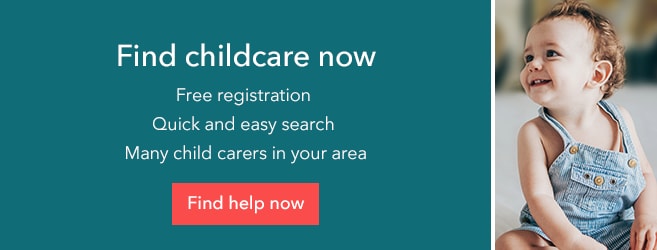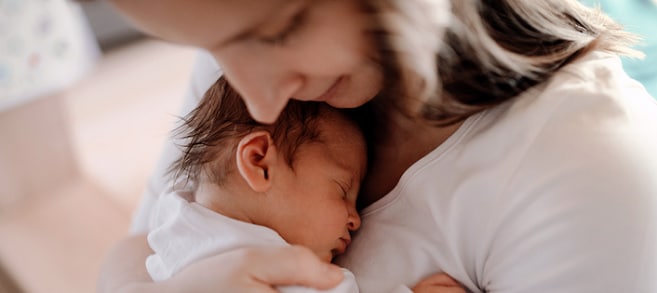Hearing your little one burst into tears just before you’re about to leave for the day can be distressing – you may want to turn around and tell them you didn’t mean it, that you’re staying!
Looking for childcare? Find carers in your area now.
However, every parent knows that they can’t realistically spend 24/7 with their baby; at some point, they will have other places to be. Dealing with separation anxiety in babies is completely normal. So rather than feeling guilty or upset, here is some helpful guidance to get you and your baby through this time.
Remember: You’re in this together
At around eight to nine months old, your baby begins to understand object permanence: the idea that you still exist even when they cannot see or hear you. This is a major cognitive milestone, but it also means that they will begin having separation anxiety. They still have no concept of time, so as far as your baby is concerned, when you leave, you could be leaving for good – whether you’re going to work for the day, or simply popping into another room. This is why they cry and show such signs of distress. They may also learn that crying can get you to come back.
You may feel mixed emotions when your baby displays separation anxiety. It’s a little gratifying when your baby wants only you, but it’s so sad, and it doesn’t help the guilt-factor. Parents are often more distressed than their babies and can project their thoughts into what the crying is about. Build up your baby’s belief that they are safe. Do this by giving experiences of being away and then being reunited. In other words, you have to leave for your baby to learn that everything will be all right.
How can you help your baby’s separation anxiety?
The mistake that many parents make is giving in to the crying. By not ever leaving your baby with someone else, you’re not giving them the opportunity to learn resiliency. Here’s what to try instead:
- Cuddle and comfort
When you’re with your little one, be sure to share in some serious cuddle time. It feels good for both of you, and it helps your baby become more secure. When your baby feels secure, they may be less anxious when you leave. - Hand your baby off briefly
Let a family member hold your baby while you take a shower. Someone is there to ensure that everything’s okay, and you reunite with your baby after your shower. This helps your baby develop psychological muscle. Your baby realises that you were gone and nothing bad happened. - Leave your baby alone — but not unsupervised
If you have a video baby monitor, you can leave your baby alone for short amounts of time — just a few minutes at first. Announce your departure by saying “Mummy/Daddy will be right back”, and come right back. You are comfortable because you can keep an eye on things through the monitor, and your baby gains independence by being alone for a few minutes. - Grow the world of others
Make sure when grandparents or friends visit, you let them hold the baby and play with them with you in another room. Build a network of family and trusted babysitters your baby starts to recognise. Your baby will begin to understand that they do survive when you’re away, and being apart will become easier.
Know the right way to say goodbye
One thing that parents should never do is try to sneak away when your baby’s not paying attention. Your baby will think you’ve simply disappeared, which could make matters worse.
Ease your baby’s anxiety by saying goodbye. Your baby will pick up on your emotions when you’re leaving. If you’re crying or offering a prolonged goodbye because you’re anxious about going, your baby is more likely to become anxious. Provide reassurance with a quick-yet-cheerful goodbye, rather than a long, drawn-out emotional departure. When your baby is first experiencing separation anxiety, try to schedule your departures when your baby is in a good mood, such as after a nap or after being fed. Once you leave, don’t turn back. Just ask the babysitter or carer to let you know when they calmed down.
If you’re still feeling anxious, just know that separation anxiety in babies is part of the growing process. Reminding yourself of that can help you walk away with more confidence that your baby’s anxiety isn’t harmful. In fact, you’ll both benefit from this experience.
Read Next: Single-sex schools: The pros and cons
Read Next: When Can Kids Walk to School Alone?
Read Next: Encouraging Your Children to Read Books

